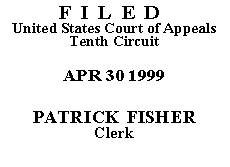

| GERALD LAFONT,
Plaintiff-Counter- Defendant-Appellant, v. JUDITH DECKER-ANGEL, Defendant-Counter- Claimant-Appellee. |
|
Plaintiff Gerald LaFont sued defendant Judith M. Decker-Angel in federal court based on diversity of citizenship, alleging fraud, conversion, and constructive trust in relation to a check for $250,000 given to defendant by plaintiff. Defendant counter-claimed for collection on a promissory note for an additional $250,000. Following a bench trial, the district court found that the $250,000 check was a gift from plaintiff to defendant and entered judgment against plaintiff on his claims. It further found that plaintiff did not intend to make a gift to defendant of both the check and the note and entered judgment against defendant on her counter-claim.(1) Plaintiff appeals, and we affirm.
In his complaint and at trial, plaintiff asserted that he issued the check to defendant for the purpose of satisfying his financial obligation toward a joint purchase of property. He alleged that instead of preserving the funds for the future purchase of property, defendant fraudulently converted the proceeds of the check for her own use. Defendant contended that plaintiff gave her the money in compensation for her services as plaintiff's companion, advisor, and lover, and in compensation for giving up her home and business in Arizona to move to Monument Valley, Utah, to work for plaintiff. Defendant denied all of plaintiff's allegations of fraud and conversion.
Plaintiff's only issue on appeal is whether the district court erred in ruling, over plaintiff's objection, that defendant's evidence and testimony that the check was a gift was not waived under Fed. R. Civ. P. 8(c). Rule 8(c) "requires a party pleading to a preceding pleading to set forth affirmatively all matters which the pleading party intends to use as an avoidance or affirmative defense." Radio Corp. of Am. v. Radio Station KYFM, Inc., 424 F.2d 14, 17 (10th Cir. 1970). Failure to plead, move under Rule 12(b), or try by consent of both parties an affirmative defense or avoidance waives that defense and bars evidence on the point as a matter of law. See id.
Here, defendant did not assert any affirmative defenses by way of answer or pretrial order, but initially raised her assertion of a gift during opening arguments at trial. Over plaintiff's objection, the court allowed the evidence, concluding that defendant's general denials of conversion and fraud adequately included the averment that she came by the check rightfully, and therefore, a gift did not need to be pled as an affirmative defense. See Appellant's App. Vol. I at 123-24.
The giving of a gift is certainly not one of the nineteen affirmative defenses specifically enumerated in Rule 8(c). The question then becomes whether giving a gift falls into the catchall category of "any other matter constituting an avoidance or affirmative defense." Fed. R. Civ. P. 8(c). "Rule 8(c) does not elaborate this catchall statement and thus offers no assistance in defining what constitutes 'an avoidance or affirmative defense.'" 5 Charles A. Wright & Arthur R. Miller, Federal Practice and Procedure § 1271, at 429-31 (2d ed. 1990). The Fifth Circuit has noted that although "the Federal Rules of Civil Procedure provide the manner and time in which defenses are raised and when waiver occurs," we look to state law for definition of the "nature of defenses." Lucas v. United States, 807 F.2d 414, 417 (5th Cir. 1986) (further quotation omitted). Here, Utah law provides us with some guidance in this matter.
Under Utah law, "a defense that merely controverts plaintiff's prima facie case is negative in character and should be pleaded in accordance with rule 8(b).[(2)] A rule 8(c) affirmative defense, in contrast, raises matter outside the plaintiff's prima facie case." Jones, Waldo, Holbrook & McDonough v. Dawson, 923 P.2d 1366, 1374 (Utah 1996) (further quotation omitted). Here, defendant's contention that the check from plaintiff was a gift does not raise a matter outside plaintiff's claims, but merely controverts plaintiff's claims by asserting that she came into possession of the funds rightfully and legally. This is in accord with this court's rationale in Marino v. Otis Engineering Corp., 839 F.2d 1404, 1408 (10th Cir. 1988), in which we drew a distinction between the introduction of evidence in support of an avoidance or affirmative defense and the introduction of evidence to refute the plaintiff's allegations in the complaint.
In sum, we agree with the district court's determination that defendant's averment that the check was a gift was not an avoidance or affirmative defense, but was introduced instead for the purpose of disproving plaintiff's claims. Therefore, the judgment of the United States District Court for the District of Utah is AFFIRMED.
Entered for the Court
Circuit Judge
*. This order and judgment is not binding precedent, except under the doctrines of law of the case, res judicata, and collateral estoppel. The court generally disfavors the citation of orders and judgments; nevertheless, an order and judgment may be cited under the terms and conditions of 10th Cir. R. 36.3.
1. We note that defendant did not enter a notice of appearance or file a responsive pleading in this appeal. The district court's ruling on her counter-claim is not before this court on appeal.
2. Fed. R. Civ. P. 8(b) provides in part that:
A party shall state in short and plain terms the party's defenses to each claim asserted and shall admit or deny the averments upon which the adverse party relies. If a party is without knowledge or information sufficient to form a belief as to the truth of an averment, the party shall so state and this has the effect of a denial.